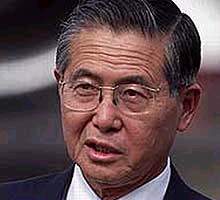Peru's former president plays his last trick
The former Peruvian President has been arrested in Chile in a risky move to come back to power
Former Peruvian President Alberto Fujimori was arrested Monday in Chile on charges involving corruption and massacres at home as he tried to return to Peru to run for re-election after five years in exile in Japan. Chilean authorities said they would study the case and could, perhaps, extradite him to Peru, but some observers say that a Chilean court would release him as it did in other previous cases of Latin American leaders who have sought political refuge.
The case with Fujimori is different, indeed, because Interpol has released an international order of capture on criminal charges. That would oblige Chilean courts to attend to the extradition request made by the Peruvian government, which seeks the former president since he fled from his post in 2000 during an official visit to Tokyo.
As such, Fujimori's move looks risky, but could eventually lead him back to power, if his supporters in Peru fight hard to get them free. In any case, his presence in the Peruvian border will be the main political issue in his country until elections.
Police arrested Fujimori, 67, at his Santiago hotel hours after his surprise arrival Sunday and took him to the investigative police academy. The arrest was ordered after the Peruvian government told Chile it would make a formal request for Fujimori's extradition. Peru's President Alejandro Toledo thanked his Chilean counterpart Ricardo Lagos for ''taking this first step'' by arresting the fugitive leader.
The Fujimori affaire comes as the bilateral relations between Peru and Chile are at their worst in decades. Last week, the Peruvian Congress passed a resolution which modifies the oceanic border between both Pacific nations.
Fujimori, a close US ally in the ninethies, had long vowed to return to Peru to seek a fourth presidential term in April's election despite the charges, and a congressional ruling barring him from holding public office until 2011. Most of Peruvians think of him as the leader of a conservative revolution that promoted pro-market policies in the country, leaving millions in poverty. On the contrary, some Peruvians want him back for having led an economic rebound in the early 1990s and crippling the Shining Path rebels who terrorized the country for years.
Peruvian authorities have 60 days to ask for Fujimori's extradition, but they were moving fast. On Monday, Toledo sent a high-level delegation led by Interior Minister Romulo Pizarro to try to expedite proceedings in Chile.
Subscribe to Pravda.Ru Telegram channel, Facebook, RSS!




